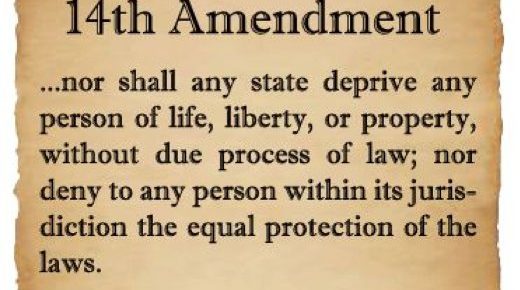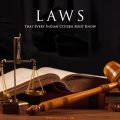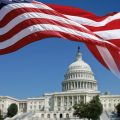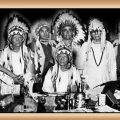
Following the Civil War in 1868, the United States adopted the Fourteenth Amendment as one of the Reconstruction Amendments. It was intended to deal with issues regarding the rights of former slaves.
Section 1. All persons born or naturalized in the United States, and subject to the jurisdiction thereof, are citizens of the United States and of the State wherein they reside. No State shall make or enforce any law which shall abridge the privileges or immunities of citizens of the United States; nor shall any State deprive any person of life, liberty, or property, without due process of law; nor deny to any person within its jurisdiction the equal protection of the laws.
Following the adoption of this amendment, there were a few people who felt that it might be applied to American Indians and give them U.S. citizenship. Indians were born in the United States and under U.S. jurisdiction. Citizenship for Indians had several implications: (1) it might give them voting rights; (2) it would give them homestead rights; and (3) it would provide them with certain legal protections, such as the right to a trial. Well-aware that the amendment had been intended for former African American slaves, however, most people, particularly government officials, did not feel that Indian people were included in this amendment.
In 1870, the Senate Judicial Committee inquired into the effect of the Fourteenth Amendment on Indian tribes. The Committee declared that the Amendment was intended to eliminate the phrase “three-fifths of all other persons” which had described slaves in the Constitution and therefore does not change the status of Indians. The Committee concluded:
“To maintain that the United States intended, by a change of its fundamental law, which was not ratified by these tribes, and to which they were neither requested nor permitted to assent, to annual treaties then existing between the United States as one party, and the Indian tribes as the other parties respectively, would be to charge upon the United States repudiation of national obligations, repudiation doubly infamous from the fact that the parties whose claims were thus annulled are too weak to enforce their just rights, and were enjoying the voluntarily assumed guardianship and protection of this Government.”
In 1871, a federal district court in Oregon, in the case of McKay v. Campbell, ruled that the Fourteenth Amendment had not made Indians citizens.
One of the reasons that Indians were not considered U.S. citizens is that they were citizens of Indian nations and therefore, according to this line of reasoning, not under U.S. jurisdiction. However, not all Indians lived on reservations, and many of those who were living in urban areas no longer maintained any tribal connections. In 1873, a Washington territorial district court ruled that Indians could not become citizens by simply severing tribal connections. According to the court, citizenship for Indians required a naturalization act by Congress. In addition, the court ruled that the Fourteenth Amendment did not apply to tribal Indians.
In 1860, Congress had passed the Homestead Act which provided for the transfer of ownership of 80 acres of unoccupied public land in exchange for a nominal fee after five years of residence. Only U.S. citizens and aliens who were eligible to become citizens could apply for homesteads. Indians were not eligible to acquire homesteads as they were not citizens nor could they become citizens. In 1874, the Secretary of the Interior ruled that the Fourteenth Amendment did not give any land rights – such as homesteading – to civilized Indians since they had not been citizens when the Amendment had been passed. The Secretary ruled that only an act of Congress could give the benefits of the land laws to Indians.
Finally, in 1884 a case testing the Fourteenth Amendment and American Indians came before the U.S. Supreme Court. John Elk was a Ponca who had left the jurisdiction of his tribe and moved to Omaha, Nebraska. He owned a home, paid taxes, and was a member of the state militia. In Elk versus Wilkins the Supreme Court declared that Indians were not citizens under the Fourteenth Amendment. While recognizing that Indians were born in the United States in a geographical sense, they were not citizens just as children born within the United States of ambassadors or other public ministers of foreign nations were not citizens. According to the court, Indian tribes were
“alien nations, distinct political communities, with whom the United States might and habitually did deal, as they thought fit…The members of these tribes owed immediate allegiance to their several tribes, and were not a part of the people of the United States.”
The Court declared that citizenship must be directly bestowed upon the Indians by the United States. David Wilkins, in a column in Indian Country Today, writes:
“For the court, the only way for even solitary, urban-based American born Indians to become citizens under the 14th Amendment was to be naturalized by a treaty provision or congressional statute.”
According to historian Laurence Hauptman, in his book Tribes and Tribulations: Misconceptions about American Indians and their Histories:
“In the twilight zone of Indian existence, the Elk decision literally made the Indian a legal alien in his native land.”
Congress responded by passing a series of acts granting citizenship to Indians (see Indians 301: American Indian Voting Rights). In 1924 and again in 1940 Congress passed acts giving citizenship to all Indians. A number of states ignored both of these acts.




Leave a Reply